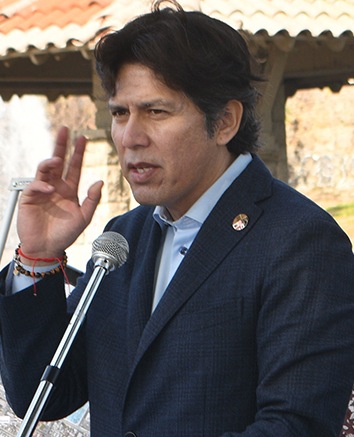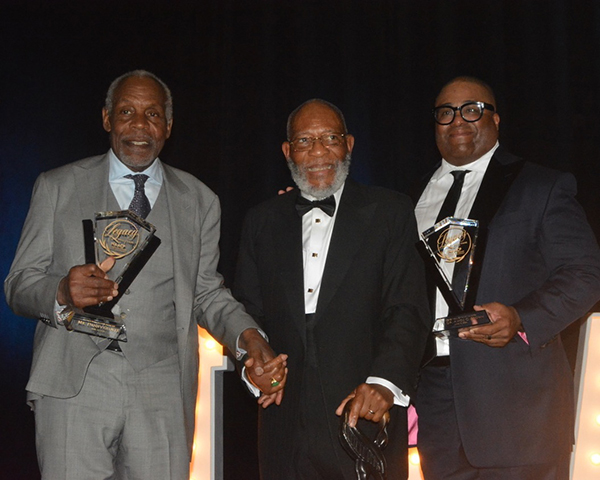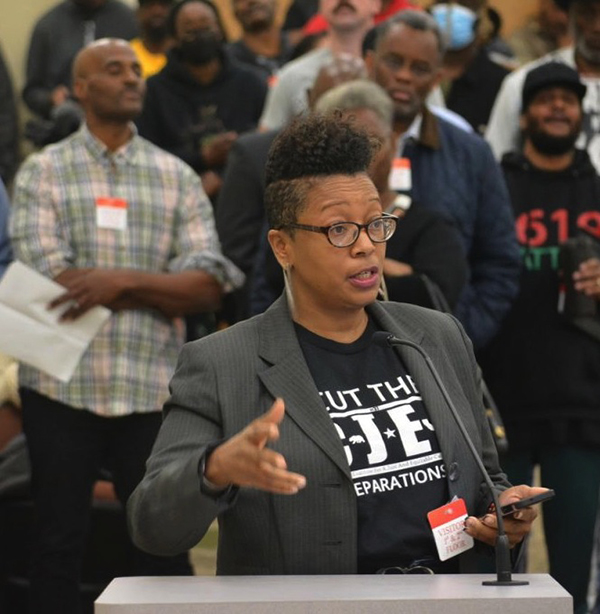By Darlene Donloe, Contributing Writer
LEIMERT PARK — Ben Caldwell is often referred to as the father of Leimert Park. He’s not real keen on that moniker, although he thinks it’s better than being called the mayor of Leimert Park.
For years, Caldwell’s KAOS Network, a for-profit community media lab, has positioned itself as a cultural mecca, home to musicians, fine artists and filmmakers.
The popular and iconic community arts center provides training in digital arts, media arts and multimedia. Classes are offered in video production, animation, website development, video teleconferencing, CD-ROM production and internet exploration.
Caldwell’s is a life well-lived. He’s an arts educator and independent filmmaker who grew up in New Mexico assisting his grandfather, who projected movies at a small theater.
At 21, Caldwell fought in the Vietnam War. He later studied painting and photography at Arizona State University, where filmmaking caught his attention.
At UCLA, he studied film and became part of the LA Rebellion, a group of African and African-American students in the UCLA School of Theater, Film and Television.
He taught film and video at Howard University in the 1980s. When he came back to Los Angeles, he settled into what he said was the only place he wanted to live — Leimert Park.
Not long after settling, he launched KAOS Network, where he gained a reputation as someone who cared about the kids in the community by giving them a platform to express themselves. His devotion to Leimert Park is palpable.
At 75, Caldwell’s careful words are that of a sage. Having led a full life, one which he makes no apologies for, he still gets up every morning with a zest for life.
Contributing writer Darlene Donloe recently interviewed Caldwell, a father of two, about his life, his KAOS and Leimert Park.
DD: You’ve been called the father of Leimert Park. Do you like that name?
BC: I guess it’s better than being called the mayor of Leimert Park. I get it. Basically what happened is that you don’t have many male role models or patriarchs in the area. With my age and experience, some people look up to me as a father figure. I guess that’s OK.”
DD: What does KAOS stand for?
BC: Everyone thinks it’s a pseudonym. It’s not. It’s a Sanskrit word that means ‘Where brilliant dreams are born.’ It fit naturally for what I was doing and trying to accomplish.
DD: How have you had to pivot since COVID-19?
BC: This has forced us to be together in a way we weren’t doing it before. We’re adjusting. I’m able to do international discussions. I can talk to Africa in real-time. I’m doing teleconferencing workshops. We’re making it work. We continue to do our work.
DD: Describe how Leimert Park has changed since you were here in the 1980s.
BC: Well, in 1984, there weren’t as many black people as there are now. There are a lot more black people now. When I came here it was 40% Black. By 2000, it was 90% Black. That’s the major change. There is something unique going on here that the rest of L.A. doesn’t see.
DD: Since 1984 you have been fostering hip-hop. Why?
BC: There always needs to be a fresh approach to looking at people in our neighborhood. Each generation here has a new kind of music.
DD: Do you actually like hip-hop?
BC: Yeah, I do. I like the genre of the youth I’m working with.
DD: You had a program called Project Blowed that was very successful.
BC: There were about 15-20 underground movements happening back then. Eminem was part of Project Blowed. There was JuJu, a Five On the Black Hand Side (poetry reading), Revolutionary Poets Café and Bananas had Kendrick Lamar in it. We had an open mic workshop for young hip-hop artists, rappers and graffiti artists. I mean we had The Game, Eminem, Ava DuVernay came out of the project. A lot of people don’t know Ava used to be a rapper. Figures of Speech was the name of her group. She was part of the L.A. Rebellion as well.
DD: You have a great rapport with young people. How are you able to relate to young people?
BC: I think what happens is people become control freaks as adults and they don’t let youth take their shot. Young people are waiting to exhale. When they are here, they can take a full breath and not feel fearful.
DD: The Art Walk has always been popular. Is it still happening every last Sunday?
BC: Yes, what we’ve done is do it over the internet. We’ve been connecting with Curacao and South Africa, and we have revisited Diaspora dialogues. We have been talking to different cultures about our similarities.
DD: You are in the heart of the community. What have you thought about the recent protests?
BC: I think it is the most wonderful thing that has happened. The millennials are feeling it. Hopefully, they are awakened again.
DD: What are your thoughts on the future of Leimert Park in light of construction on the Crenshaw/LAX Rail Line?
BC: The plus is we have been working on this for 20 years. We had a 2020 vision. I think I’m finding that the communities are amazed at how much we’ve done. We won our own bid, the only one that was black in the city. We’ve been having a bid since 2000. I’m really looking forward to it opening. We can use it to create more stories in Leimert Park and the blackness of here.
DD: When you were at UCLA you were part of the LA Rebellion a group of African and African-American students in the UCLA School of Theater, Film and Television, as part of an Ethno-Communications initiative designed to be responsive to communities of color. Who else was part of this group?
BC: At the time, the LA Rebellion was Charles Burnett, Larry Clark, Haile Gerima and Billy Woodberry. We were about creating something unique, something different for a cinematic landscape. We produced a lot of films. I worked on some of them as an editor, a writer or the cinematographer.
DD: You’ve done several films like “Medea,” “I & I: An Allegory,” “Eyewitness: Reflections of Malcolm X & the O.A.A.U.” and “La Buena Vida (The Good Life)”. What do your films say?
BC: My films trace historical and cultural connections. If it works well, it can make people see something in a way they’ve never seen it before and then possibly change things we felt. I see film as a master storyteller.
DD: You are a huge film enthusiast. How do you feel about film?
BC: I feel that film is the most important communicative device we have that can get to a whole lot of people. Film can change this culture that has grabbed us and tried to divest us of our history and make us hybrid-Negroes in this America. Film can change that really fast.
DD: Who is Ben Caldwell?
BC: He’s all of those things we talked about. I’m living free the only way a black man can live free in a slave state. When they go at me one way, I can live as another person. It doesn’t stop me from feeling like I’m a man.
DD: You’ve been at this a long time. What makes you happy and gives you joy?
BC: Being here and being able to imagine that I’m able to get paid to do everything I want to do. I wake up and like what I do. Education got me out of digging ditches. I can tackle all these crazy things that I’ve talked about. I’m very blessed.













